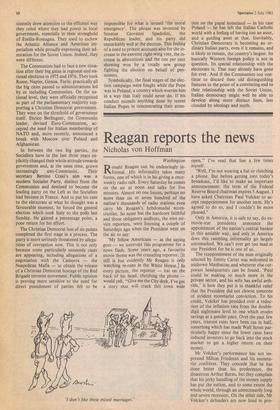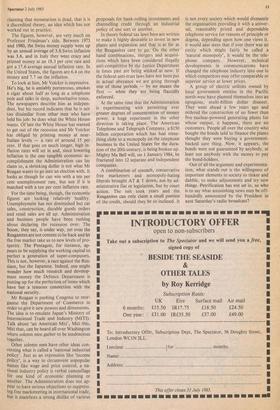Reagan reports the news
Nicholas von Hoffman
Washington
Ronald Reagan can be endearingly in- formal. His informality takes many forms, one of which is in his giving a once- weekly radio talk. Every Saturday he comes on the air at noon and talks for five minutes. Almost no one listens, perhaps no more than six or seven hundred of the nation's thousands of radio stations even carry Mr Reagan's hebdomadal eccen- tricities. So none but the hardcore faithful and those obligatory auditors, the wire ser- vice reporters, were listening a couple of Saturdays ago when the President went on the air to say:
'My fellow Americans — as the saying goes — we interrupt this programme for a news flash. Some years ago, a favourite movie theme was the crusading reporter. [It still is but evidently Mr Reagan is only watching re-runs in the White House.] In every picture, the reporter — hat on the back of his head, clutching the phone would yell, "Give me the City desk, I've got a story that will crack this town wide
'I don't like these mixed marriages.'
open." I've read that line a few times myself.
'Well, I'm not wearing a hat or clutching a phone. But before getting into today's broadcast, I'd like to make an important announcement: the term of the Federal Reserve Board chairman expires 5 August. I have asked Chairman Paul Volcker to ac- cept reappointment for another term. He's agreed to do so, and I couldn't be more pleased.'
Only in America, it is safe to say, do ex- movie-star presidents announce the appointment of the nation's central banker 'in this amiable way, and only in America does this rambling informality go largely unremarked. We can't ever get too mad at our President for he is one of us.
The reappointment of the man originally selected by Jimmy Carter was welcomed in midtown Manhattan and wherever else cor- porate headquarters can be found. 'Paul could be making so much more in the private sector, and his wife has awful arth- ritis,' is how they put it in thankful relief that the President did not choose someone of strident monetarist conviction. To his credit, Volcker has presided over a reduc- tion of the inflation rate from the double- digit nightmare level to one which erodes savings at a gentler pace. Over the past few years, interest rates have been cut in half, something which has made Wall Street par- ticularly happy since the lower rates have induced investors to go back into the stock market to get a higher return on their money.
Mr Volcker's performance has not im- pressed Milton Friedman and his moneta- rist confreres. They concede that he has done better than his predecessor, the disastrous Arthur Burns, but they complain that his jerky handling of the money supply has put the nation, and to some extent the whole world, through an unnecessarily long and severe recession. On the other side, Mr Volcker's defenders are now loud in pro- claiming that monetarism is dead, that it is a discredited theory, an idea which has not worked out in practice.
The figures, however, are very much on Professor Friedman's side. Between 1973 and 1980, the Swiss money supply went up by an annual average of 3.8.Swiss inflation was 3.6, and in Italy they went crazy and printed money at an 18.3 per cent rate and got a 17.6 average annual inflation rate. In the United States, the figures are 6.4 on the money and 7.7 on the inflation.
To look at him, Mr Volcker is impressive. He's big, he is amiably portentous, smokes a cigar about half as long as a telephone pole and talks in deep, authoritative tones. The newspapers describe him as indepen- dent, but his record indicates that he is not too dissimilar from other men who have held his job: he does what the White House wants. Of late the White House has wanted to get out of the recession and Mr Volcker has obliged by printing money at near- Italian levels — a rate of around 15 per cent. If that goes on much longer, high in- flation rates will set in and, since lowering inflation is the one tangible economic ac- complishment the Administration can lay claim to, a shrinking dollar is not what Mr Reagan wants to go into an election with. It looks as though he can win with a ten per cent unemployment rate, but not if it is matched with a ten per cent inflation rate.
For the time being, though, the economic figures are looking relatively healthy. Unemployment has not diminished but car sales, construction, durable goods orders and retail sales are all up. Administration and business people have been rushing about declaring the recession over The boom, they say, is under way, yet even the Reaganites are not content to lie back and let the free market take us to new levels of pro- sperity, The Pentagon, for instance, ap- pears to be supplying the working capital to perfect a generation of super-computers. This is not, however, a race against the Rus- sians, but the Japanese. Indeed, one might wonder how much research and develop- ment money the Defence Department is putting up for the perfection of items which have but a tenuous connection with the national security.
Mr Reagan is pushing Congress to reor- ganise the Department of Commerce in order to give it new powers and dimensions. The idea is to emulate Japan's Ministry of International Trade and Industry (MITI). Talk about 'an American Miti', Miti this, Miti that, can be heard all over Washington where solemn men gather to be tendentious together.
Other solemn men have other ideas con- cerning what is called a 'national industrial policy'. Just as an expression like 'income policy', is a way to circumvent unpopular names like wage and price control, a na- tional industry policy is verbal camouflage for one kind of economic planning or another. The Administration does not ap- pear to have serious objections to suppress- ing free marketeering in international trade, but it manifests a strong dislike of various
proposals for bank-rolling investments and channelling credit through an industrial policy of one sort or another.
In theory federal tax laws here are written to make it highly desirable to invest in new plants and expansion and that is as far as the Reaganites care to go. On the other hand combinations, mergers and acquisi- tions which have been considered illegally anti-competitive by the Justice Department in times past are being winked at now. If the federal anti-trust laws have not been put in actual abeyance we are going through one of those periods — by no means the first — when they are being flaccidly enforced.
At the same time that the Administration is experimenting with permitting ever greater degrees of concentration of money power, a huge experiment in the other direction is taking place. The American Telephone and Telegraph Company, a $150 billion corporation which has had some- thing close to a monopoly on the telephone business in the United States for the dura- tion of the 20th century, is being broken up. Mighty Ma Bell will, on 1 January 1984, be fractured into 12 separate and independent companies.
A combination of staunch, conservative free marketeers and monopoly-hating liberals brought AT & T down, not by ad- ministrative fiat or legislation, but by court action. The suit took years and the Reaganites can only claim a small portion of the credit, should they be so inclined. It is not every society which would dismantle the organisation providing it with a univer- sal, reasonably priced and dependable telephone service for reasons of principle or dogma, depending upon how one views it. it would also seem that if ever there was an entity which anight fairly be called a 'natural monopoly', it would be the tele- phone company. However, technical developments in communications have changed the telephone industry into one in which competitors may offer comparable or superior service at lower prices.
A group of electric utilities owned by local government entities in the Pacific north-west have planned themselves into an egregious, multi-billion dollar disaster. They went ahead a few years ago and ordered the construction of no fewer than five nuclear-powered generating plants for whose output, it happens, there are no customers. People all over the country who bought the bonds sold to finance the plants thought they were buying a government- backed sure thing. Now, it appears, the bonds were not guaranteed by anybody, at least not anybody with the money to pay the bond-holders.
Out of all the argument and experimenta- tion, what stands out is the willingness of important elements in society to tinker and dabble, to make adjustments and try new things. Petrification has not set in, so who is to say what astonishing news may be off- handedly announced by the President in next Saturday's radio broadcast?







































 Previous page
Previous page